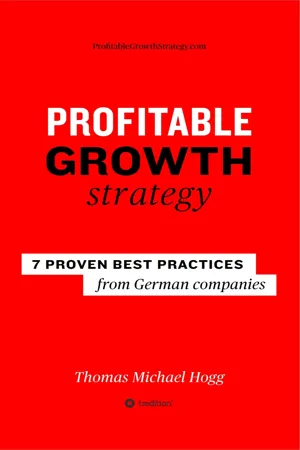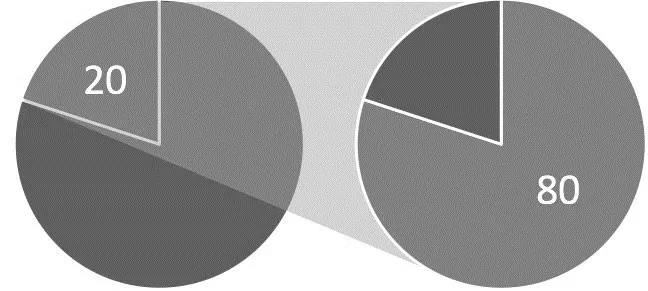![]()
PART I
8020 Focus and
No distraction
![]()
1 – 8020 Focus and No distraction
Doing a successful and result-oriented job is not as easy as it seems. In 1999, I was stunned by the productivity level and focus of my work colleague at a bank in the South of Germany. Mrs. Muller, a trusted and long-time employee in that bank, was scanning and double checking all high-income transfer receipts. I noticed two aspects at the same time, there were many zeros on each receipt and there were only a few receipts scanned compared to the amount of numerous boxes of thousands of documents. I was confronted the first time with the 8020 concept. All of the high and important transfers were taken into account whereas the majority of transfers weren't included by Mrs. Muller. She only focused on the most important transfers. But as a matter of fact the real lessons learned from her was her focus on time and to deliver her tasks each day in 8 hours because she had a 40 hours week. Every day she performed and there was zero distraction to do what she had to do on her 8 hour-workday. She was delivering concentrated value by simply doing what she was supposed to do.
Sounds like a normal working performance. But, there is one common mistake I see day by day in the numerous offices I visit.
Employees are very often “just not” doing what they are supposed to do.
And even worse, their boss, the CEO, is very often neither doing what he/she is supposed to be doing.
They are trapped in the daily business and the incoming operative problems, mails, social media and non-strategic tasks. They are busier with efficiency than with effectiveness. Doing the right things versus doing things right.
CEO challenge
The key challenge for a CEO is to manage that he/she and importantly his/her team are focusing and executing on the right things each day. And that doing the right things impact financially on profitable growth. CEOs have to define where the company will be in 2 years and not take part in each single decision which his or her managers are responsible for.
CEOs have to define the long-term vision and the fundamental business model elements (for instance closing constant deals with their key account, developing and hiring an outstanding sales team, defining a required service level or establishing a best in class business practice or process) that provide the company a competitive advantage and generate financial value.
CEOs are responsible for the strategy.
Strategy is a synonym for renunciation. To focus, CEOs have to trade off.
How much time do you spent each day on operational issues?
How much of your time are you in the 8020 zone?
In 1906, Vilfredo Pareto noted that 20% of the population in Italy owned 80% of the property. He proposed that this ratio could be found continuously in the physical world and theorized it might indicate a natural law. For business, we know that in most cases the 8020 rule comes true:
o 80% of work is completed by 20% of your team.
o 20% of your best clients (or customer segment) makes 80% of your sales.
o 20% of your products makes 80% of your sales.
o 20% of your best sales reps makes 80% of your sales.
o 80% of your complaints come from 20% of your customers.
o 80% of value is achieved with the first 20% of effort.
o 80% of project politics come from 20% of your stakeholders.
o 80% of problems originate with 20% of projects.
o 80% of software problems are caused by 20% of bugs.
o 80% of customers only use 20% of software features.
16x Pareto Principle
80÷20=4
20÷80=0.25
4÷0.25=16 → 16x
The right focus with the Pareto principle to define and execute on key projects, clients, priorities, people, tasks, … brings you
16x more results = impact = success I always include the 8020 principle in all strategy courses I give, as a key part to plan a successful year in order to deliver more customer + employee value and to receive more profitable growth for the company.
Through the years, I have seen that many CEOs, especially of SMEs, lack to see the BIG PICTURE; whereas the most successful CEOs have become 8020 masters because they lead their companies to achieve ambitious goals while focusing energetically on the most important actions to reach the higher goals, for instance:
- They visit and develop the relationship of their key clients and prospects to understand market needs and requirements.
- They talk frequently to and retain their key employees, especially key sales people.
- They are aware of disruptive trends and key challenges. Hereby, they are better prepared for an unpredictable crisis.
- They set clear goals and communicate the importance of strategy execution.
- They empower employees and show them the importance of the 8020 rule.
You need to focus perfectly on the 20% that will deliver you the 80% of the desired result. Every decision and action has to be made consciously if our time is used effectively.
These are 8 logic steps to become a successful "profitable growth company":
1. Set and remind the sales and EBITDA goals with the majority of your employees and quarterly reward those who achieved them.
2. Focus on high-gross margin projects, products, services and customers.
3. @CEO: Be the number 1 sales guy in the company that inspires customers to buy your products or services.
4. Hire and retain the best sales people in the industry.
5. Develop benchmark and 8020 sales & marketing channels. Very importantly embrace and dominate digital marketing because nowadays every client is digital.
6. Have strong partners and allies that help you to sell.
7. Cross-selling is key. Your adjacencies strategy has to be well defined and executed.
8. Measure and communicate your sales, profit and productivity indicators.
Now, let's have a look at one of the most admired companies in Germany. DAIMLER recently defined the following strategy focus*:
“Four future-oriented fields are set to radically change the nature of mobility: greater vehicle connectivity, advances in automated and autonomous driving, the development of digital mobility and transport services, and electric mobility.
Our objective i...


